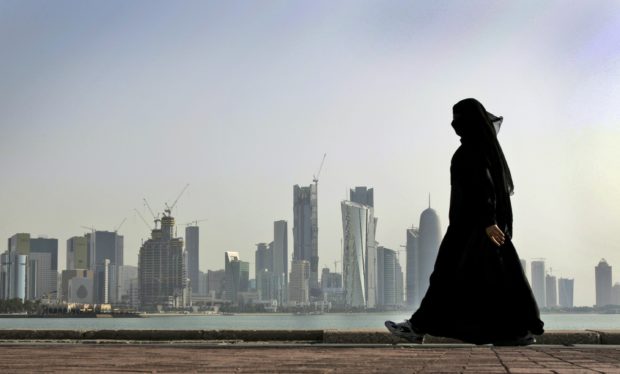4 Arab countries sever diplomatic relations with Qatar

In this May 14, 2010 file photo, a Qatari woman walks in front of the city skyline in Doha, Qatar. Saudi Arabia and three Arab countries severed ties to Qatar on Monday, June 5, 2017 and moved to cut off land, sea and air routes to the energy-rich nation that is home to a major U.S. military base, accusing it of supporting regional terror groups. (AP Photo/Kamran Jebreili, File)
DUBAI, United Arab Emirates—Four Arab nations cut diplomatic ties with Qatar early on Monday morning, further deepening a rift among Gulf Arab nations over that country’s support for Islamist groups and its relations with Iran.
Bahrain, Egypt, Saudi Arabia and the United Arab Emirates (UAE) all announced they would withdraw their diplomatic staff from Qatar, a gas-rich nation that will host the 2022 Fifa World Cup and serves as home to a major US military base.
The countries said they would eject Qatar’s diplomats from their territories, while Saudi Arabia said Qatari troops would be pulled out from the ongoing war in Yemen.
Yemen’s internationally recognized government also cut relations with Qatar, saying it was supporting the decision by the Saudi-led coalition to end Qatar’s participation in the war on the Houthis there.
Cut off from Arabian Peninsula
The government of President Abed Rabbo Mansour Hadi said it had severed ties with Qatar in part over the latter’s support for extremist groups in Yemen “in contradiction with the goals announced by the countries supporting the legitimate government.”
Qatar’s foreign ministry said there was “no legitimate justification” for the countries’ decision, even as it allayed fears its citizens would be affected by the “violation of its sovereignty.”
All the nations said they planned to cut air and sea traffic. Saudi Arabia said it would also shut its land border with Qatar, effectively cutting off the country from the rest of the Arabian Peninsula.
It wasn’t immediately clear how Monday’s announcement would affect Qatar Airways, one of the region’s major long-haul carriers that routinely flies through Saudi airspace.
Suspended flights
Etihad, the Abu Dhabi-based carrier, said it would suspend flights to Qatar “until further notice.”
Emirates, the Dubai-based carrier, and FlyDubai, a budget carrier, announced they too would suspend Qatar flights starting on Tuesday.
Even before Monday, Qatar had appeared unperturbed by the growing tensions. On May 27, Qatar’s ruling emir, Tamim bin Hamad Al Thani, called Iranian President Hasan Rouhani to congratulate him on his reelection.
The call was a clear, public rebuttal of Saudi Arabia’s efforts to force Qatar to fall in line against the Shiite-ruled nation, which the Sunni kingdom sees as its No. 1 enemy and a threat to regional stability. Qatar shares a massive offshore gas field with the Islamic republic.
Qatar is also home to the sprawling al-Udeid Air Base, which is home to the US Central Command and some 10,000 American troops. It wasn’t clear if the decision would affect American military operations.
Terrorist, sectarian groups
Saudi Arabia said it took the decision to cut diplomatic ties due to Qatar’s “embrace of various terrorist and sectarian groups aimed at destabilizing the region,” including the Muslim Brotherhood, al-Qaida, the Islamic State group and groups supported by Iran in the kingdom’s restive eastern province of Qatif.
Egypt’s foreign ministry accused Qatar of taking an “antagonist approach” toward Egypt and said “all attempts to stop it from supporting terrorist groups failed.”
‘Growing list of disbelief’
The tiny island nation of Bahrain blamed Qatar’s “media incitement, support for armed terrorist activities and funding linked to Iranian groups to carry out sabotage and spreading chaos in Bahrain” for its decision.
In Sydney, US Secretary of State Rex Tillerson said he didn’t believe the diplomatic crisis would affect the war against the Islamic State group in Iraq and Syria.
“I think what we’re witnessing is a growing list of disbelief in the countries for some time, and they’ve bubbled up to take action in order to have those differences addressed,” Tillerson said.
Fake comments
“We certainly would encourage the parties to sit down together and address these differences,” he added.
The decision comes after Qatar alleged in late May that hackers took over the site of its state-run news agency and published what it called fake comments from its ruling emir about Iran and Israel.
Its Gulf Arab neighbors responded with anger, blocking Qatari-based media, including the Doha-based satellite news network Al-Jazeera.
Support of Islamists
Qatar has long faced criticism from its Arab neighbors over its support of Islamists.
The chief worry among them is the Muslim Brotherhood, a Sunni Islamist political group outlawed by both Saudi Arabia and the UAE as it challenges the nations’ hereditary rule.
Gulf countries led by Saudi Arabia fell out with Qatar over its backing of then Egyptian President Mohammed Morsi, a Brotherhood member.
In March 2014, Saudi Arabia, the UAE and Bahrain recalled their ambassadors from Qatar over the rift. Eight months later, they returned their ambassadors as Qatar forced some Brotherhood members to leave the country and quieted others.
However, the 2014 crisis did not see a land and sea blockade as threatened now.
In the time since, Qatar repeatedly and strongly denied it was funding extremist groups.
However, it remains a key financial patron of the Hamas-controlled Gaza Strip and has been the home of exiled Hamas official Khaled Mashaal since 2012.
Western officials also have accused Qatar of allowing or even encouraging funding of Sunni extremists, like al-Qaida’s branch in Syria, once known as the Nusra Front. —AP